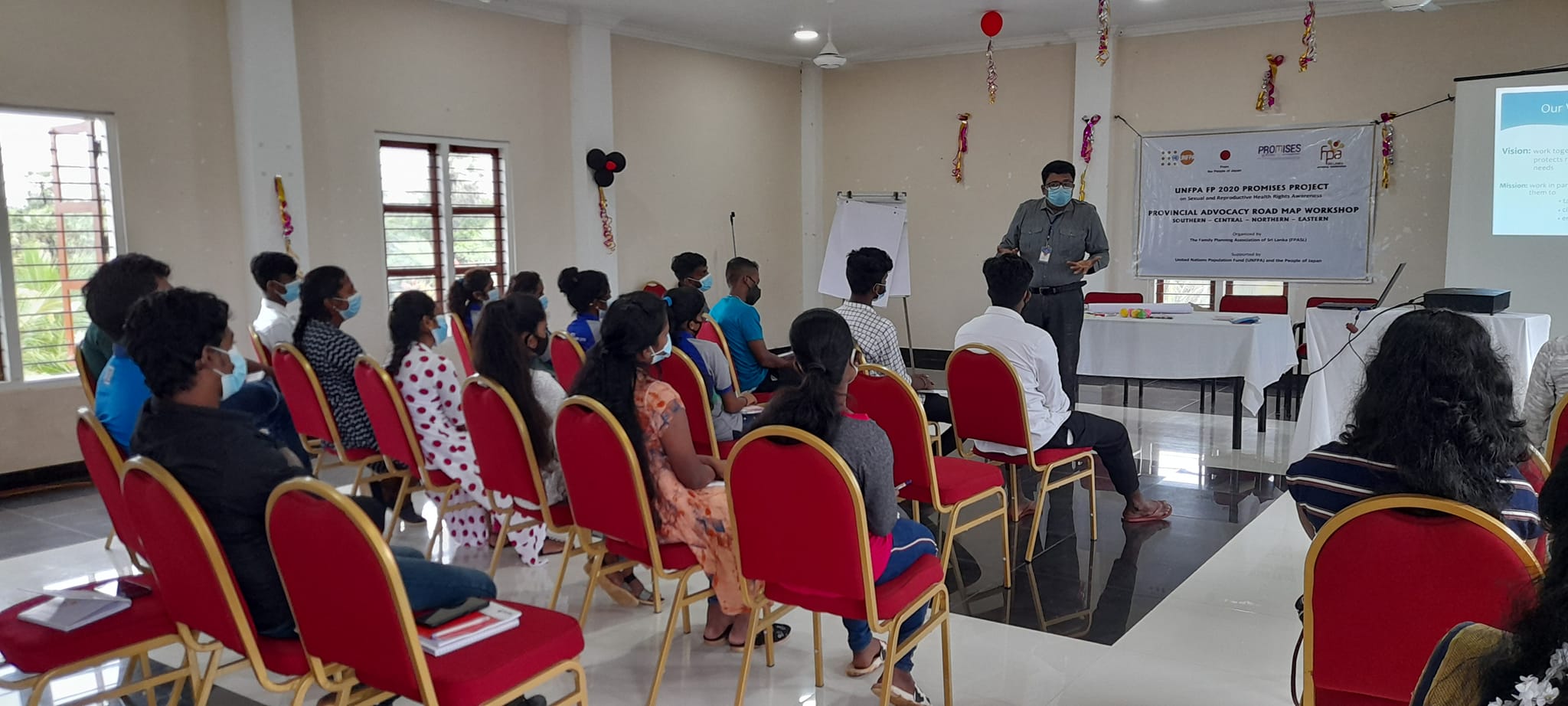Project on Improving Access to Information and Services on SRHR and Sexual and Gender-Based Violence for Women and Young People

UNFPA FP2020 Programme on Improving Access to Information and Services on SRHR and Sexual and Gender-Based Violence for Women and Young People – supported by the United Nations Population Fund (UNFPA) and the people of Japan
To progress in Sri Lanka’s commitment to the Women, Peace and Security (WPS) agenda, the Government of Sri Lanka accepted the Government of Japan’s invitation to partner under the G7 WPS partnerships initiative. As such, the goal of the FP2020 Project will be, “By the year 2022, women and young people will have improved access to SRHR information and services and be able to counter myths and prejudices that perpetuate communal violence”.
The UNFPA FP2020 Project supports the Government of Sri Lanka, specifically the Ministry of Health and Indigenous Medical Services, Ministry of Education and the Ministry of Women and Child Affairs. In particular, this project identifies and improves SRH knowledge of Community Leaders, religious leaders, civil society and youth groups and service providers to facilitate attitudinal and behavioural changes. At the community level, the project implements a public awareness and sensitization campaign to improve perceptions about SRHR. At the organizational level, the project builds the capacity of service providers and organizations to ensure access to quality services. This will ensure that individuals have the right knowledge and attitude towards SRHR and will respect each other’s choices with regard to SRH and facilitate access to services.
The project focuses on five provinces in Sri Lanka: Southern, Central, Eastern, Northern and Western provinces which are mandated by the donor organization –UNFPA.
Increasing the usage of modern family planning methods from 74.2% to 79% by 2025 is one of the main aims of this project which the Ministry of Health has taken the lead in signing the FP2020 contract. With the ultimate aim of contributing to the state sector’s efforts to raise the percentage of modern contraceptive use FPA will be working with targeted subpopulations in targeted districts to promote awareness about, and usage of, modern contraceptive methods.
The project is intended to increase and improve rights-based family planning methods in the country by conducting Training of Trainer’s workshops for leaders of CSO’s, youth camps, meetings with religious leaders, introducing a curriculum etc. This project targets vulnerable groups such as youth, single women, working women, older women and urban poor women. Groups such as youth, working women, and women above the age of 40 usually do not receive Government services. The above-mentioned groups will be covered by this project to promote knowledge of modern contraceptive methods.
With effective knowledge awareness programs conducted by the public health nursing sisters and public health midwives, knowledge of family planning is extremely wide-reaching in all districts of the country. In spite of its wide reach, the unmet need for family planning in Sri Lanka indicates that there are certain vulnerable populations that remain unreached, without adequate access to information and modern contraceptive services. Not only is this project intended to ensure female empowerment, but it is also intended to contribute to the achievement of national development goals.
In addition to raising awareness among vulnerable groups on SRHR and gender rights, the project is aimed to promote “reconciliation” in the country. It was identified in the project that to have a well-balanced society, it is essential to promote harmony among people. There are many misconceptions related to SRHR based on different ethnic and religious beliefs in the country. This has created tension among communities. As a result, this project will address the reconciliation issue through changing attitudes and perceptions of different communities on SRHR.
FPA’s approach to garnering the support of civil society to contribute to the desired outcomes of FP2020, the following are the main activities that are to be carried out during the project period.
- Production of IEC, BCC materials in three languages and development of three video clips.
- The sensitization of religious and community leaders.
- Capacity building training programs two in each district to train Trainers on SRHR, for representatives of CSOs and women activists from the NGO sector. FPA envision this process unravelling through a cascade effect, in which FPA’s consultants together with the MOH train CSO staff, who in turn train the public in their districts.
- Conducting grass-root level trainings, ten in each district by Trained Trainers of CSOs in their village level on re-branding family planning and modern contraceptives. These programs are conducted by the area Public Health Midwife and the Trainer trained by FPA.
- Conducting two residential youth camps (two day workshops) in each district targeting the youth component as one of the most in-need subpopulations in the country. The youth camps are a forum where the youth representing their youth clubs, are able to discuss the specific challenges they face in accessing and making use of modern contraceptive methods while being trained on the methods that exist to them and how best to access them. In return, it is envisaged that the youth will provide positive and creative feedback about possible rebranding strategies. These camps are very important in which FPA will gather context-specific barriers and using the information provided by these youth, FPA will be able to create specific, targeted messaging to be used in IEC material for upcoming years, where these IEC materials will be distributed on a social media platform, as this appears to be one of the most effective methods of information dissemination amongst youth presently.
- Holding Advocacy Road Maps in each Province. This will be a follow-up of the capacity-building sessions on Sexual and Reproductive Health conducted for young people, keep them engaged and to support the youth to advocate for SRHR in their districts. This will be a forum to conceptualize different action plans and advocacy ideas to implement within their respective communities.
- Sensitization programs on access to information and services on SRHR for women who work in the private sector specifically in the garment sector and women from low income urban settings, who most often work in the informal economy, in order to glean the barriers they face to access and maintain use of forms of modern contraception. These sensitization programs will be used to inform them about the resources and services available to them.
.png)


